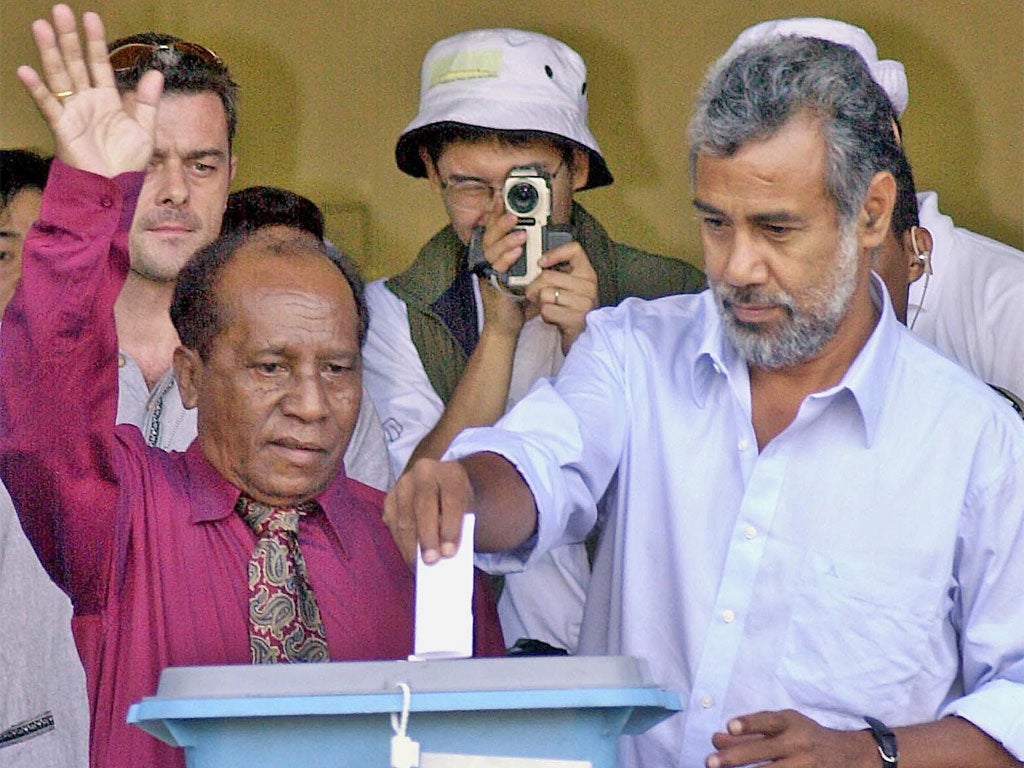Francisco Xavier do Amaral: Politician who helped lead thestruggle to liberate East Timor

At the funeral of Francisco Xavier do Amaral thepresident of East Timor paid handsome tribute to the man he described as "a symbol of unity in our aspiration to independence and freedom, a courageous nationalist with faith in democracy." President Jose Manuel Ramos-Horta said that "Grandfather Francisco" was a good and brave man, one of the leaders who showed the way in the cause of liberation from Indonesian occupation. The president's speech made no reference to the many years of captivity, humiliation, hardship and exile which Amaral suffered during a difficult life.
In a sense his misfortunes mirrored those which for centuries afflicted East Timor, a south-east Asian speck in the ocean a few hundred miles north of Australia with a population of around a million. Under Portuguese rule for centuries, it suffered from Japanese occupation during the Second World War, when tens of thousands of its people died. After the war it again became a Portuguese colony.
When Portugal pulled out in 1975 Amaral became the first president of an independent "Democratic Republic of Timor-Leste." But his time in office, and the dream of self-rule, lasted for just nine days before the infinitely larger and more powerful Indonesia staged an invasion. At that point Amaral and his colleagues, and many of the local population, took to the hills to stage guerrilla resistance.
Born the son of a local "king" in the mountainous central region of East Timor, he had qualified for the priesthood but instead had become an anti-colonial activist. He founded the Timorese Social Democratic Association (ASDT), which was later renamed the Revolutionary Front for an Independent East Timor, or Fretilin.
Fugitives in the hills, Fretilin split, with Amaral concerned that civilians who had aligned themselves with the fighters were ill-fed and increasingly suffering from illness. Professor Damien Kinsbury, author of an authoritative work on East Timor, explained: "Following Indonesia's intensive military campaign resulting in heavy casualties, Amaral argued in favour of sending civilians back to occupied areas.
"The majority Fretilin view was that civilians should not be separated from the military struggle. Disagreement over strategy reflected a growing rift between Fretilin's moderates and more doctrinaire Marxists. As a result, 'counter-revolutionaries' were purged from the party, with some being executed."
Amaral later explained the condition of the civilians: "They were suffering in the jungle from starvation and all kinds of diseases, and I felt that if they wanted to surrender themselves they should be permitted to do so. But the other group did not agree. According to them, this was a sign of my willingness to surrender."
Despite being branded as a defeatist traitor Amaral escaped execution, but for a year he was held captive under harsh conditions. He was slowly starved and held at times in a hole in the ground and sometimes in a bamboo stockade. Finally, as Indonesian forces closed in, he was abandoned by his one-time colleagues to be captured by the invaders.
Once again his life was spared but he was subjected to humiliating treatment, this time for a quarter of a century. He was taken to Indonesia, where he was put to work as a houseboy serving General Dading Kalbuadi, one of the military leaders of the invasion.
In addition to his domestic chores and tending to the general's horses, he was periodically used by the Indonesians for propaganda purposes. Under orders, he would appear on television urging East Timor to accept Indonesian rule. The regime in East Timor was condemned by the international community as brutal; in 2001 United Nations prosecutors filed indictments accusing Indonesian soldiers and militia of "planned mass murder".
A UN prosecutor said: "Young men aged 16 to 30 who had some education were tied up in pairs. Then they killed 47 out of 55 of them with guns, swords and machetes."
These activities took place in 1999 when, under pressure from the UN and other elements, the Indonesians agreed to a ballot on independence. The vote went strongly in favour of independence. But, according to the CIA, after the vote Indonesian forces waged a large-scale scorched-earth campaign of retribution, killing approximately 1,400 Timorese and turning more than a quarter of a million into refugees. Most of the country's infrastructure, including irrigation systems, water supplies and electricity supplies, was destroyed.
Amaral had meanwhile been released from domestic servitude to live for several years in poverty in a shack in Jakarta. In 2000 he returned to East Timor, once again becoming involved in politics and attempts to rebuild the ravaged country.
He was regarded affectionately asa long-time fighter for independence. In the years that followed he twicestood for the presidency, explaining that his candidacy was based on giving voters a democratic choice. He received 17 and 14 per cent of the vote. He again put his name forward for the presidential election this month, althoughhe had received a cancer diagnosislast year and had become progressively weaker. He eventually pulled out of the campaign.
On his death Francisco Guterres,an old colleague from his days of fighting in the mountains, said of him:"He was a true politician for the people, who fought for justice and freedom all of his life. To this end, in this presidential campaign his platform was democracy and the greater rights of all East Timorese."
Francisco Xavier do Amaral, politician: born Turiscai, Portuguese Timor 1937; died Dili, East Timor 6 March 2012.
Subscribe to Independent Premium to bookmark this article
Want to bookmark your favourite articles and stories to read or reference later? Start your Independent Premium subscription today.

Join our commenting forum
Join thought-provoking conversations, follow other Independent readers and see their replies